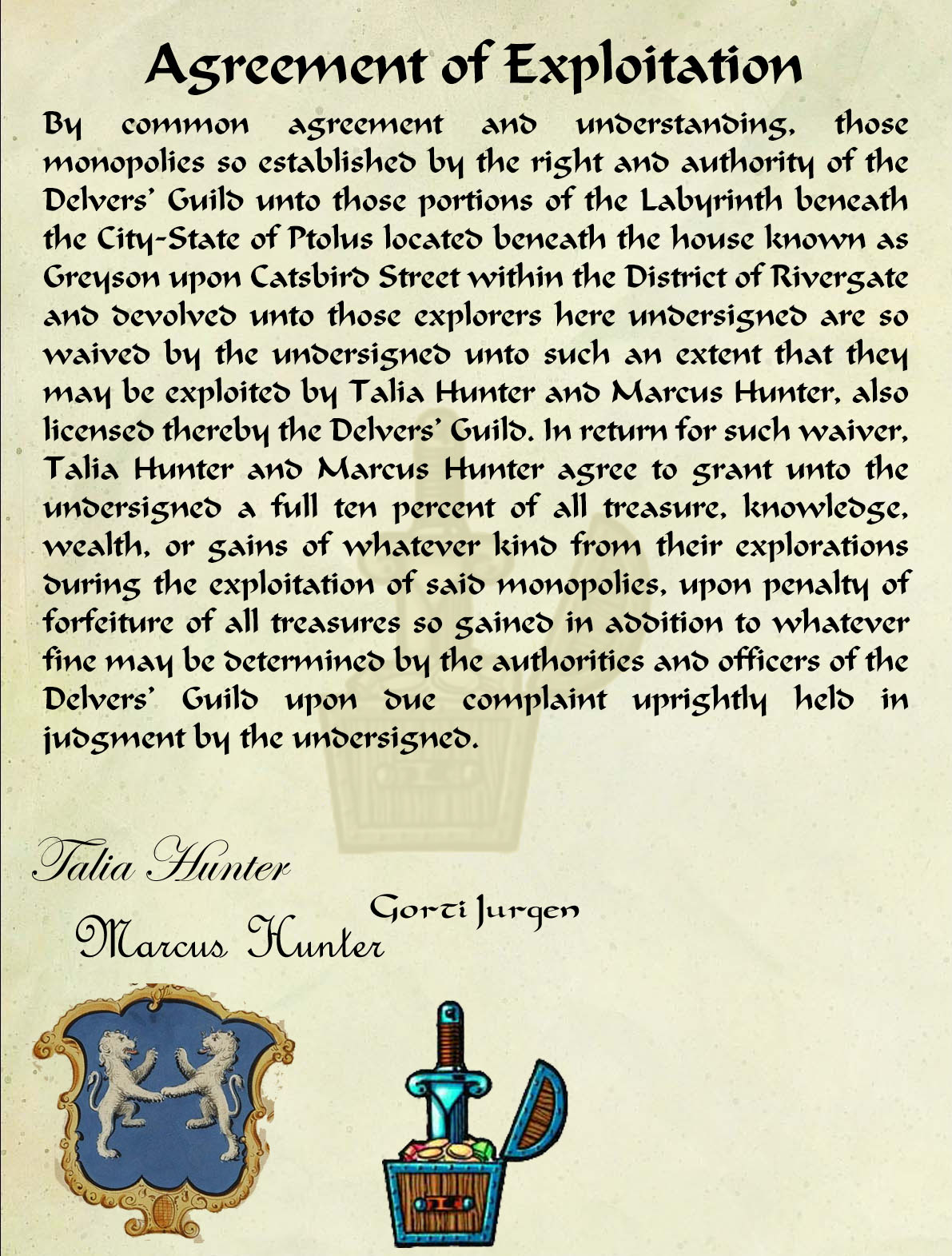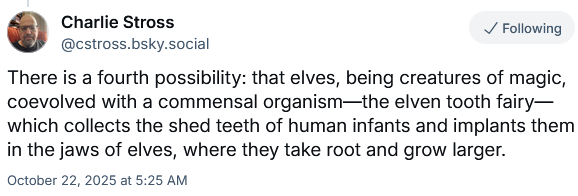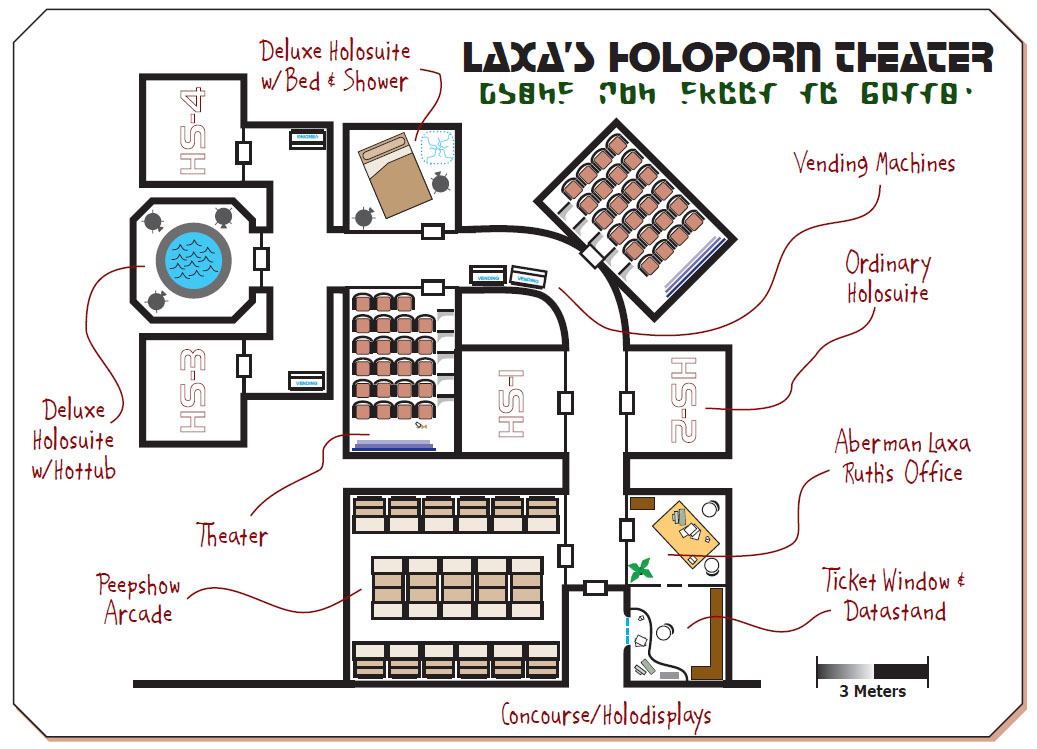
SESSION 48A: A NIGHT IN THE NECROPOLIS
January 9th, 2010
The 26th Day of Kadal in the 790th Year of the Seyrunian Dynasty

They cleaned the hall and moved the corpse into Ranthir’s make-shift laboratory. By the time Elestra was ready to force answers out of the drakken, they had carefully hashed out two questions to ask her and decided that they would confer on the third depending on the answers they received on the first two.
As Elestra animated the corpse, it jerked into a sitting position. The drakken’s head snapped back, audibly breaking her neck. Her words gurgled jaggedly in her throat.
“What was your mission?”
“To retrieve the askara research materials and kill the elf.”
(“Kill the elf?!” Tee demanded. “Why the elf?!”)
“Where were you supposed to report back to?”
“The Temple of Deep Chaos.”
“Where can we find Wuntad?”
“In the Haven of Gisszaggat.”
Black blood burst from her mouth and the body collapsed.
REVENGE SERVED IN FIRE
“That’s right,” Tee said. “We took all their research. All of that work for nothing.” She thought about it for a moment. “Do we actually need that research? Couldn’t we just burn it and make sure they never got it back?”
“I’d rather not… burn it,” Ranthir said, with a slightly strangled tone to his voice.
After conferring they decided that what they could do was to have Ranthir make a duplicate of the research and then destroy the original in a way that would make the cultists think that it no longer existed.
“We’ll send them burned scraps of it,” Tee said. “Or, better yet, I can cut out pieces of it and use it to write a message to Arveth.”
“This might be why they want to kill you,” Elestra said.
“Probably,” Tee said. “But I’ll make my own death.”
During the night Ranthir, sustained by a magical ring, had been able to continue his studies for several more hours. He spent that time studying the crystalline armor, concluding that – although it was derived from similar technomantic arts – it was not actually chaositech, nor did it bear the taint of such items. It would be safe to use.
Knowing that it was safe, Tor was more than happy to take the miraculously endurant armor. It would make an admirable replacement for his breastplate.
Shortly thereafter, the construction crew showed up for the last morning of their work on the suite. Tee quickly shuffled the body into her bag of holding (“for later disposal”).
They retired to Tor’s room. Tee had Ranthir immediately copy a few of the sheets from the askara research, then she took them, scorched them, and cut out semi-burned letters and words to form a message:
I’m still alive and loving the armor.
Love, The Elf.
THE HUNTER PARTY
Tee returned to the others. While they were gathering up their gear for the day, there came a knock at the door. They exchanged looks. None of them were expecting company.
Agnarr got up to answer it. Standing outside were a young man with his brown hair pulled back in a ponytail and a lithe woman with black hair down past her shoulders. The young man stretched out his hand, “My name’s Marcus Hunter. We’re looking for Tithenmamiwen. We have business from the Delver’s Guild.”
Agnarr slammed the door in their face and went back to polishing his sword.
With a sigh and perhaps a bit of a laugh, Tee went to the door and opened it again. Marcus introduced himself again and the woman as his sister, Talia Hunter.
Agnarr, with a bad feeling about all of this in his ornery gut, brusquely pushed past them and headed downstairs.
Tee invited them into the room and the others sat down with them around a table.
After proper introductions had been made, Marcus launched into his story. “My sister and I are members of the Delvers’ Guild. Our father, Adatol Hunter, was a member, too.”
Before Adatol had died, Marcus explained, he had found references to and descriptions of a specific section of Ghul’s Labyrinth and the passwords for the bluesteel doors leading there. He had spent the last years of his life dreaming of the treasures he would find if he could only find the places described.
The only problem? The records he had found referred to the “Laboratory of the Beast.” Without knowing where the laboratory was located, he couldn’t follow the instructions. But the research he had performed in trying to track it down included a reference to the Laboratory being used as a place to store the “Drill of the Banewarrens”.
It wasn’t hard to see where this was going: When Tee had started shopping the drill around, it had come to the attention of the Hunters and they had begun inquiries. They knew that the Laboratory of the Beast must lay beyond the Greyson House complex that the group had claimed a guild monopoly on exploring.
“We had papers drawn up with the guild allowing us to exploit your monopoly in exchange for a ten percent return.” Marcus presented them with a contract.

Ranthir tried to weedle the passwords or their maps out of them, but they politely refused.
“Are you planning to go down there by yourselves?” Tor asked.
“No,” Talia said. “We’ll be hiring a full expedition.”
The party tried to offer a reverse deal: They’d do the delving if the Hunters gave them the information they had, and in exchange the Hunters would get a cut without taking any risk on themselves. The Hunters, however, were adamant: They wanted to do it to honor their father’s legacy. And they wanted the challenge for themselves.
(“Besides,” Tor said. “When would we have time for that?”)
They asked the Hunters to wait downstairs while they discussed the matter. The Hunters agreed and excused themselves.
The debate focused around the Hunters themselves: Could they be trusted? How did they know they weren’t somehow in league with the cultists? Or the Surgeon in the Shadows?
“Is it even safe for them to be down there?” Elestra asked.
“They’re delvers,” Tee pointed out. “They’re going to be go delving somewhere.”
Eventually they decided to sign the contract, but with a few additional provisos: First, they wanted the Hunters to leave the goblin clan alone. Second, they wanted first pick of any material relating to the Dreaming Arts. Third, they wanted full access to any lore the Hunters retrieved from the depths. Fourth, when the Hunter expedition was completed, they wanted to know the passwords they had used to bypass the bluesteel doors.
When they fetched the Hunters back up for more negotiations, the Hunters agreed to their terms with the proviso that they would trade knowledge for knowledge: In exchange for the maps from their expedition and the password for the bluesteel door, they wanted a copy of the maps that Ranthir and Dominic had made while exploring the Laboratory. This was readily agreed to, and Ranthir began making a copy of their maps… and when the first (while perfectly functional and accurate) proved not to be elegant enough, he scrapped it and began anew (this time executing a proper work of art).
While he worked, Ranthir made a point of asking the Hunters about putting the passwords in trust. (“Just in case you don’t come back…”) The Hunters said that they would be filing an expedition plan with the Delvers’ Guild which would include that information. “We’re also purchasing retrieval insurance through the Guild,” Talia explained.
The contract was properly amended and signatures were placed on both copies (one for the party and the other to be filed with the Delvers’ Guild showing the Hunters’ right to exploit their monopoly).
Running the Campaign: Contract Handouts – Campaign Journal: Session 48B
In the Shadow of the Spire: Index

















